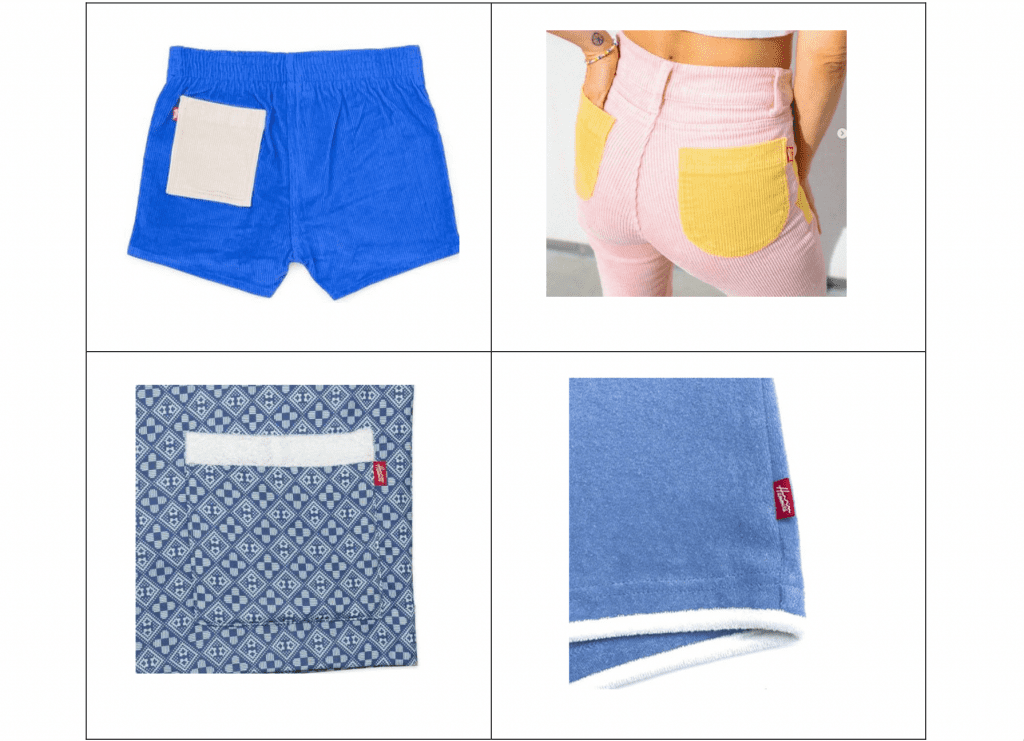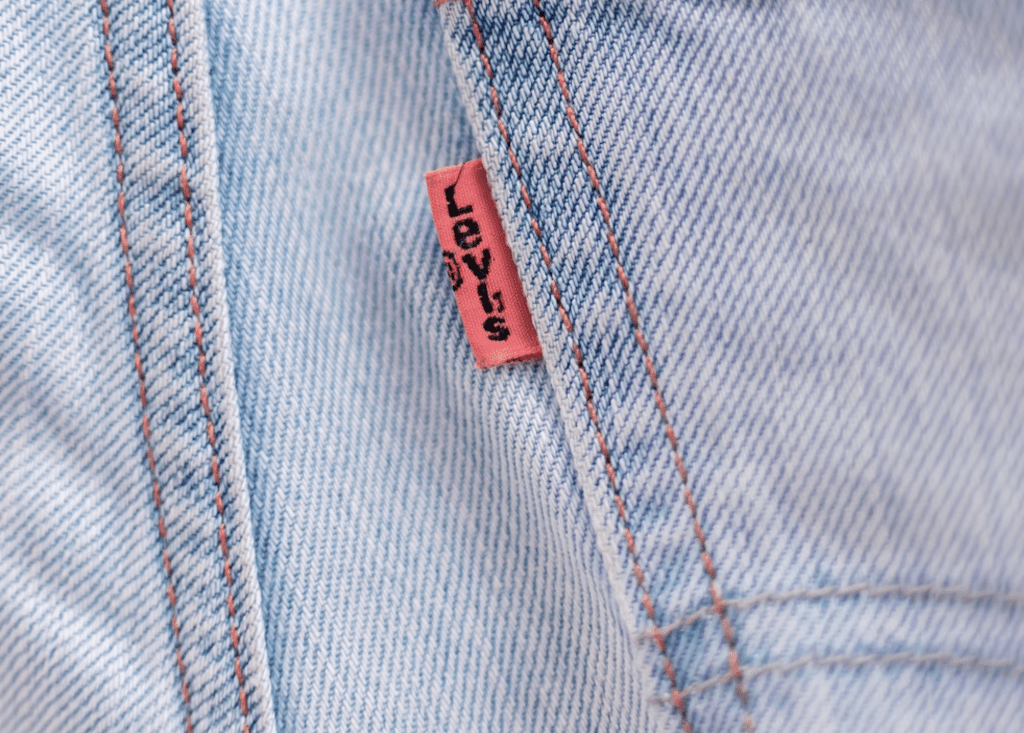Levi’s has filed its latest trademark lawsuit – this time taking issue with a rival apparel company over its use of little fabric tags as “a symbol for its own apparel products.” According to the complaint that it filed in a California federal court on November 10, Levi Strauss & Co. (“Levi’s) claims that Santa Barbara-based brand Hammies is infringing – and diluting – the “famous” tab trademark that appears on almost all of the “millions of pairs of jeans” and other products that Levi’s sells every year and that is “recognized around the world and throughout the United States by consumers as signifying authentic, high-quality LEVI’S® garments.”
In its complaint, Levi’s claims that it began using its now-well-known tab trademark back in 1936, making it one of “the oldest and most well-respected apparel trademarks in the world.” Fast forward to 2022 and the San Francisco-based denim-maker states that it maintains an arsenal of trademark rights in (and registration for) the tab mark, including for tabs that “sometimes bear the famous LEVI’S® trademark, and sometimes bear only the ® symbol.” Hammies has run afoul of those rights, per Levi’s by “manufactur[ing], sourc[ing], market[ing], and/or selling substantial quantities of garments bearing [a fabric] tab that are highly similar to [its own registered] tab trademarks and are likely to confuse consumers about the source of Hammies’ products and/or a relationship between Hammies and [Levi’s].”
In addition to causing Levi’s to “lose sales of its genuine clothing product,” Levi’s claims that “Hammies’ actions have caused and will continie to cause [it] irreparable harm for which money damages and other remedies are inadequate.” These include creating a likelihood of confusion among consumers about the source of the allegedly infringing Hammies products; “depriving [Levi’s] of its rights to use and control use of its trademarks and maintain its reputation with consumers, licensees and collaborators;” and “causing others to believe the distinctive features of the [Levi’s] tab trademark may be misappropriated for their use,” among other things.

While Levi’s claims that it has written to Hammies demanding it cease such alleged infringements, and Hammies “promised to cease all advertising, promotion, offer, display, and sale of products bearing the Hammies tab,” it now maintains that “after many months of delay and despite repeated reports to Hammies that it was still promoting the Hammies tab on its website and social media accounts, Hammies has refused to honor its commitment to stop and is, now in increasing quantities, continuing to promote the Hammies tab on the company’s website at www.hammies.com and on social media accounts.” With the foregoing in mind, Levi’s sets out claims of trademark infringement and dilution, as well as unfair competition, and is seeking injunctive relief and monetary damages.
A rep for Hammies was not immediately available for comment.
A Growing List of Lawsuits
Hardly Levi’s first tab-related lawsuit, the denim giant has been embroiled trademark fights with the likes of Kering-owned Saint Laurent, LVMH’s Kenzo, Barbour, and Vineyard Vines, among others, in recent years for allegedly offering up apparel bearing pocket tabs that are “highly similar to [its] tab trademark and are likely to confuse consumers about the source of [their] products and/or a relationship between [them] and Levi’s.”
While most of those cases ended up settling relatively swiftly, the Barbour case, which the British apparel and outerwear marker actually lodged against Levi’s, seeking a declaration from the court that it was not infringing Levi’s tab trademarks, played out for more than a year, and was rife with strongly-worded allegations from Barbour. In particular, Barbour argued that the cease-and-desist letter that it received from Levi’s back in 2018 was “a classic example of severe overreaching by a company that has the dubious distinction of being one of the world’s biggest trademark ‘bullies.’” To be specific, Barbour asserted that Levi’s “is one of the most litigious apparel companies in the United States, if not the world,” earning itself a “a well-deserved reputation as a trademark ‘bully,’ having filed more than 300 trademark lawsuits since 1989.”
Mirroring the assertions made by many others that have landed on the receiving end of Levi’s tab-centric lawsuits, Barbour maintained that since its tabs (or “flags” as the brand called them) have the word “Barbour” clearly printed on them, “it is hard to conjure up a situation where consumers would be ‘confused’ or ‘deceived’ into thinking the Barbour flags in any way relate to Levi’s.’” Barbour further contended that Levi’s allegations were without merit since there had “never been a single instance where a consumer or potential consumer has expressed any such confusion [to Barbour] between its products and those offered by Levi’s.”
That case ultimately settled in 2019, but only after Barbour sought Second Circuit review of Levi’s earlier win (on a motion to dismiss) and then subsequently alerted the court that it would withdraw its appeal, bringing the case to a close.
Saint Laurent similarly fought back against Levi’s attempt to enforce its tab trademarks, arguing that “consumers regularly encounter decorative pocket ornaments sold by a large number of third party users,” such as DKNY, Stussy, Carhartt, and Paul Smith, “all of [which] are apparently able to coexist with Levi Strauss’ tab trademark in the marketplace.” Paris-based Saint Laurent also pointed to the price points at play for its jeans, which retail for between “$550 and $2,590 per pair,” versus Levi’s $20 jeans, and YSL’s use of “clear markings featuring the Saint Laurent trademarks” on its wares, as examples of why consumers were not likely to be confused as its use of all-black pocket tabs. Still yet, Saint Laurent lodged a number of cancellation counterclaims in an attempt to get the court to invalidate four of Levi’s tab trademarks. The parties ended up settling within a matter of months.
As for its notably litigious stance, Levi’s has long held, “At Levi Strauss & Co., our trademarks are one of the company’s most valuable assets, and we work actively to protect our trademark rights.”
The case is Levi Strauss & Co. v. Hammies Company, 3:22-cv-07056 (N.D. Cal.).











